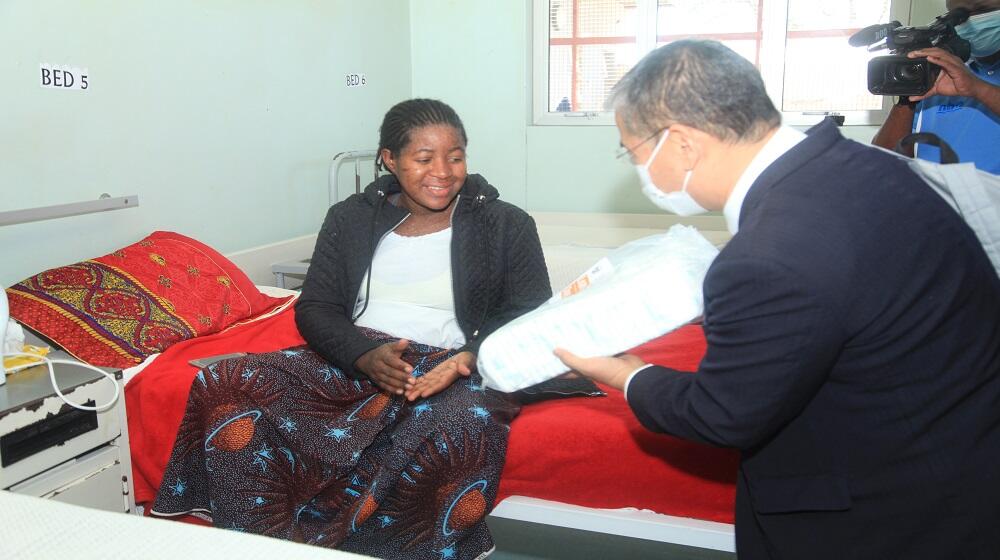KATIMA MULILO, Namibia − In July 2022 the Government of Namibia took away all COVID-19 regulations, and slowly but surely life is coming back to normal. However, the effects of the devastating pandemic can still be felt, especially in the health sector. The Leaving No One Behind Project contributes to the combating of Gender-Based Violence (GBV) and as a response intervention in the context of COVID-19.
On 28 July 2022 the Leaving No One Behind Project funded by the Government of Japan handed over dignity kits to the Maternity Ward at the Katima Mulilo Hospital. The Zambezi Region is one of the eight regions where the project is implemented to secure the continuity of essential lifesaving interventions and safeguard vulnerable women and girls’ rights, particularly pregnant and lactating women. In total 150 pregnant and lactating women received dignity kits. The kits contained various essential items including sanitary pads, diapers, malongo soap, facecloth, toothpaste, and brush that are in line with the project objectives.
In a speech read on his behalf, Hon. Sampofu, Governor of Zambezi Region, emphasised that women come from far to be closer to the essential health services. He highlighted that some women have to travel with small boats to get access to a road and in that case, road transport is not guaranteed. For expectant women, this is a lot to ask and the Governor’s Office has been working with different stakeholders to improve this situation.
The Sister Nurse in charge of the Hospital Maternity of the Katima Mulilo State Hospital ward also indicated that the handover of the Dignity Kits is timely and essential for women. She further indicated that due to poverty, some women come to the hospital to deliver without hygiene items 'with no sanitary pads and no diapers.
The Sustainable Development Goals (SDGs) call for everyone, including women to enjoy their rights and to have real choices in all aspects of their lives.
“The Sustainable Development Goals (SDGs) call for everyone, including women to enjoy their rights and to have real choices in all aspects of their lives,” said Ms. Sheila Roseau, UNFPA Namibia Country Representative.
“I am very happy that UNFPA was able to come to Katima Mulilo with this far-reaching project and reach the farthest left behind”. The Project handed over dignity kits at the maternity ward but the recipients came from as far afield as 300 kms away.
The dignity kits are part of a comprehensive effort to promote sexual and reproductive health and address GBV in the region under the Leaving No One Behind Project.
Beverly Simasiku is expecting her first child and she is one of the women who have come from far to be at the hospital. She came from Kasika which is a flood area over 100km away. “I just want to give my thanks to Japan and I am so happy for all the mothers,” she said.
“You have come to make sure that you receive all the care you require to deliver healthy babies. The Zambezi Region cares for the health and wellbeing of its people and pregnant women, lactating mothers and babies are integral,” she said.
UNFPA Namibia relies on strong, established partnerships with Implementing Partners (IPs) to reach the milestones of the project. For the activities in Zambezi Region, UNFPA Namibia worked together with the Office of the Governor, the Office of the Chief Regional Officer, the Ministry of Health, the Ministry of Education, and the management of ST. Kizito School and Cheshire Home to hand over 375 dignity kits to pregnant, lactating women, vulnerable adolescent girls adolescents living with disability in school.
“The Embassy of Japan remains a true friend to Namibia and will continue to support efforts in line with the embassy’s foreign policy,” said Mr. Koji Hase, First Secretary, Head of Economic Cooperation and Economic Section, Embassy of Japan in Namibia.
“I look forward to more success stories highlighting how lives are changed particularly those of adolescent girls and women in the region.”


